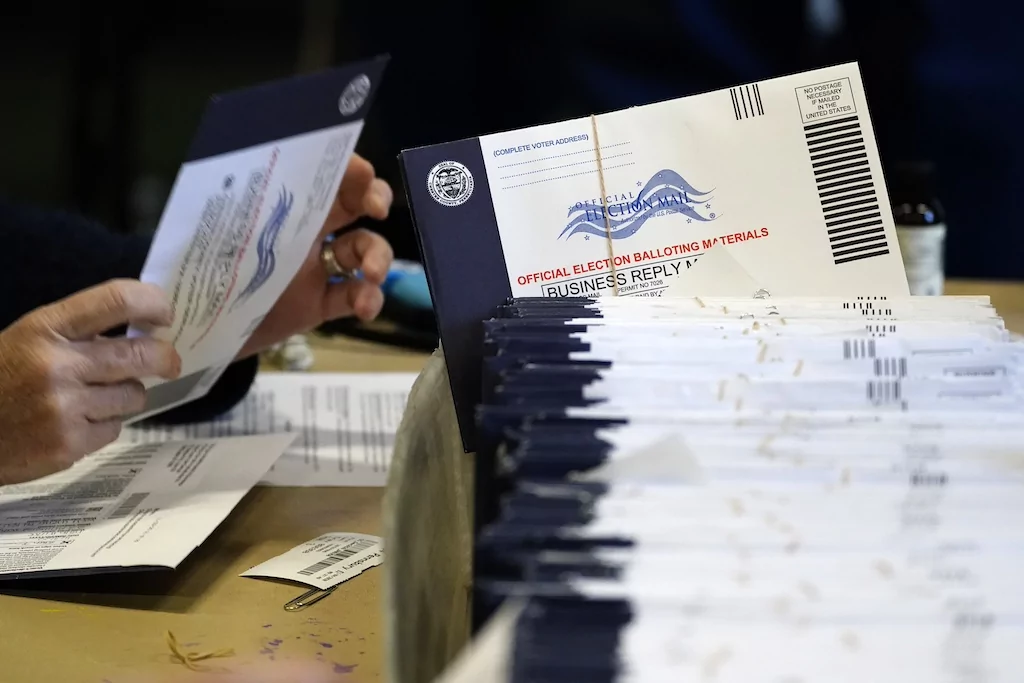

Swapping out the presidential candidate at the top of a ticket roughly 100 days before Election Day tends to shake up the electoral map. Vice President Kamala Harris has helped Democrats feel better about holding on to North Carolina, a reliably blue state in presidential contests that former President Donald Trump looked to have an inside track to picking off when he was facing President Joe Biden.
The Tar Heel State has been a fringe battleground for most of the 2024 cycle. It’s a firmly purple state that tends to lean toward Republicans at the state level, though it has a record of electing Democratic governors and casting its Electoral College votes for Democrats. However, with popular Gov. Roy Cooper (D-NC) term-limited and the fiery, controversial Lt. Gov. Mark Robinson, a Republican, running to replace him, Republicans are feeling bullish about their chances of turning over the leadership and records in the state.
As part of our Battleground Ballots series, White House Reporter Christian Datoc ran through everything you need to know about the contested landscape.
Beyond its status as a swing state stuffed with persuadable voters, North Carolina is especially important for the two major presidential campaigns because how voters there think about them right now could determine their futures. Many voters will wait until after the first presidential debate on Sept. 10 to cast their ballots. More will hold off until Election Day itself on Nov. 5. But voters are going to start receiving their mail-in ballots on Friday.
Unlike in 2020, Republicans are less concerned about mail-in ballots in North Carolina. The party has broadly accepted the new status quo and is encouraging voters to take advantage of absentee and early voting opportunities if they are so inclined.
What is frustrating Republicans is the state’s alleged unwillingness to clean up voter rolls and ensure that only citizens are registering to vote and casting ballots.
“Despite efforts to increase election security since the last general election, the North Carolina State Board of Elections has been slapped with six lawsuits over the past 40 days,” Christian wrote.
The Republican National Committee sued the state Board of Elections last month for not checking questionnaires that would have identified noncitizens who had registered to vote. It also sued the board to remove 200,000 voters from the rolls in a separate suit.
“The NCSBE has once again failed in its mandate to keep noncitizens off the voter rolls, fueling distrust and jeopardizing our elections. We are committed to the basic principle — and commonsense law — that only Americans decide American elections,” RNC Chairman Michael Whatley said in a statement. “Deliberately failing to follow the law, right before our country’s most important election, is inexcusable.”
Democratic-leaning organizations are involved in the election lawsuit game as well.
The NAACP has been fighting a six-year battle to void the state’s voter ID law.
And when the state isn’t fighting with either of the two major parties, it is going round and round with Robert F. Kennedy Jr., who wants to have his name removed from ballots in the state after scratching his way onto them with his We the People Party.
Kennedy withdrew from the presidential contest last month and has since thrown his support behind Trump. But his presence on ballots in several key states could be enough for his former supporters to still mark him down as their choice, cutting into Trump’s share and possibly tipping the contest in Harris’s favor.
Click here to read Christian’s full report on everything you need to know about North Carolina in 2024.
Baby bump?
When the Supreme Court overturned Roe v. Wade two years ago, abortion proponents raised the alarm that the decision was going to sap the numbers of new obstetricians and gynecologists as well as hollow out labor and delivery wards.
Half of that prediction appears prescient. While there is a falling number of OB-GYN medical students, and labor wards are closing in some areas, the root cause doesn’t appear to be any anti-abortion law that has passed, according to a new study Healthcare Reporter Gabrielle Etzel wrote about this morning.
“Democrats running in the 2024 elections have highlighted abortion bans in 24 states as the reason women lack access to OB-GYN care, even in emergency situations such as miscarriage or ectopic pregnancy,” Gabrielle wrote.
“But a new study published recently from the CLI, the think tank arm of the anti-abortion advocacy group SBA Pro-Life America, notes that structural problems with medical education have contributed to this problem for more than the past two years since Dobbs,” she wrote.
A study published in Annals of Family Medicine last year warned that because abortion training is often a part of OB-GYN training, though it isn’t required for accreditation, states that banned the procedure wouldn’t be training doctors to perform it, driving them away from the programs entirely.
“These bans have raised concerns about the availability of comprehensive reproductive health training for clinicians in abortion-restrictive states,” several doctors wrote in the introduction of the study. “For medical residencies in obstetrics and gynecology (OB/GYN), Vinekar et al conducted an analysis on the projected impact of Dobbs before the decision and found 45% of accredited OB/GYN residency programs were in states anticipated to ban abortion if Roe was overturned.”
But straight-line projections rarely come true. Gabrielle wrote this morning that medical school enrollment is up, but the number of OB-GYN residencies is down.
“Although the number of medical school graduates, including OB-GYNs, is up overall, there are not enough residency program spots available for doctors post-graduation,” Gabrielle wrote.
“While the number of OB-GYN residency applications for states with abortion bans fell by 2% from 2022 to the 2023 match cycle, virtually all OB-GYN residency spots were filled the year immediately following the Dobbs decision,” she wrote.
And when it comes to labor and delivery wards closing, it is often happening in rural communities where there are fewer people and fewer births. And births aren’t just falling in rural areas.
“Last year, there were only 3.6 million babies born in the U.S., according to the Centers for Disease Control and Prevention, and the number of babies born each year has been on a downward trend since its peak of about 4.14 million live births in 2005,” Gabrielle wrote.
Click here to read more about the disappearing OB-GYN programs across the country.
New from us
Only Americans should decide American elections
GOP senator calls for Cold War-era tactic to counter China
With no convention bounce, Harris has limited chances to pull away from Trump
In case you missed it
Trump said he’s not guilty — again
More longtime Republicans are abandoning Trump
The White House is tight-lipped about who is coaching Harris on debate tactics
Anti-Israel protesters are picking up where they left off on college campuses
You probably shouldn’t ask Alexa to help you decide who to vote for
For your radar
Biden has nothing on his public schedule.
Harris will travel to New Hampshire to speak at a campaign event at 2:50 p.m.
White House press secretary Karine Jean-Pierre will brief reporters at 1:30 p.m.
Trump will participate in a town hall event on Fox with moderator Sean Hannity at 9 p.m.





